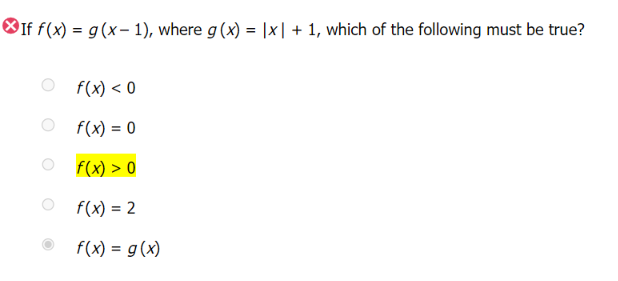Events & Promotions
|
|

GMAT Club Daily Prep
Thank you for using the timer - this advanced tool can estimate your performance and suggest more practice questions. We have subscribed you to Daily Prep Questions via email.
Customized
for You
Track
Your Progress
Practice
Pays
Not interested in getting valuable practice questions and articles delivered to your email? No problem, unsubscribe here.
- Nov 20
07:30 AM PST
-08:30 AM PST
Learn what truly sets the UC Riverside MBA apart and how it helps in your professional growth - Nov 22
11:00 AM IST
-01:00 PM IST
Do RC/MSR passages scare you? e-GMAT is conducting a masterclass to help you learn – Learn effective reading strategies Tackle difficult RC & MSR with confidence Excel in timed test environment - Nov 23
11:00 AM IST
-01:00 PM IST
Attend this free GMAT Algebra Webinar and learn how to master the most challenging Inequalities and Absolute Value problems with ease. - Nov 25
10:00 AM EST
-11:00 AM EST
Prefer video-based learning? The Target Test Prep OnDemand course is a one-of-a-kind video masterclass featuring 400 hours of lecture-style teaching by Scott Woodbury-Stewart, founder of Target Test Prep and one of the most accomplished GMAT instructors.
Kudos
Bookmarks
C
Be sure to select an answer first to save it in the Error Log before revealing the correct answer (OA)!
Difficulty:
 25%
(medium)
25%
(medium)
Question Stats:
81% (01:31) correct 19%
(01:58)
wrong
19%
(01:58)
wrong  based on 910
sessions
based on 910
sessions
History
Date
Time
Result
Not Attempted Yet
If f(x) = g(x - 1), where g(x) = |x| + 1, which of the following must be true?
(A) f(x) < 0
(B) f(x) = 0
(C) f(x) > 0
(D) f(x) = 2
(E) f(x) = g(x)

Functions.png [ 24.92 KiB | Viewed 10565 times ]
(A) f(x) < 0
(B) f(x) = 0
(C) f(x) > 0
(D) f(x) = 2
(E) f(x) = g(x)
Attachment:
Functions.png [ 24.92 KiB | Viewed 10565 times ]
Kudos
Bookmarks
callumdye
Since g(x) = |x| + 1, then f(x) = g(x - 1) = |x - 1| + 1 = (nonnegative value) + 1 = positive. Thus, f(x) > 0.
Answer: C.
General Discussion
Kudos
Bookmarks
Bunnel soln is perfect but i did it longer way
If f(x) = g(x-1), where g(x) = |x| + 1, which of the following must be true?
Now
g(x-1)=|x-1|+1
If x-1>0 (implies x>1)
g(x-1)=x-1+1=x Always positive
if x-1<0 (implies x<1)
g(x-1) = -(x-1)+1
g(x-1) = 2 - x
This will again always be positive because all values of x<1
Hence f(x)=g(x-1)>0
f(x)>0
c
If f(x) = g(x-1), where g(x) = |x| + 1, which of the following must be true?
Now
g(x-1)=|x-1|+1
If x-1>0 (implies x>1)
g(x-1)=x-1+1=x Always positive
if x-1<0 (implies x<1)
g(x-1) = -(x-1)+1
g(x-1) = 2 - x
This will again always be positive because all values of x<1
Hence f(x)=g(x-1)>0
f(x)>0
c













